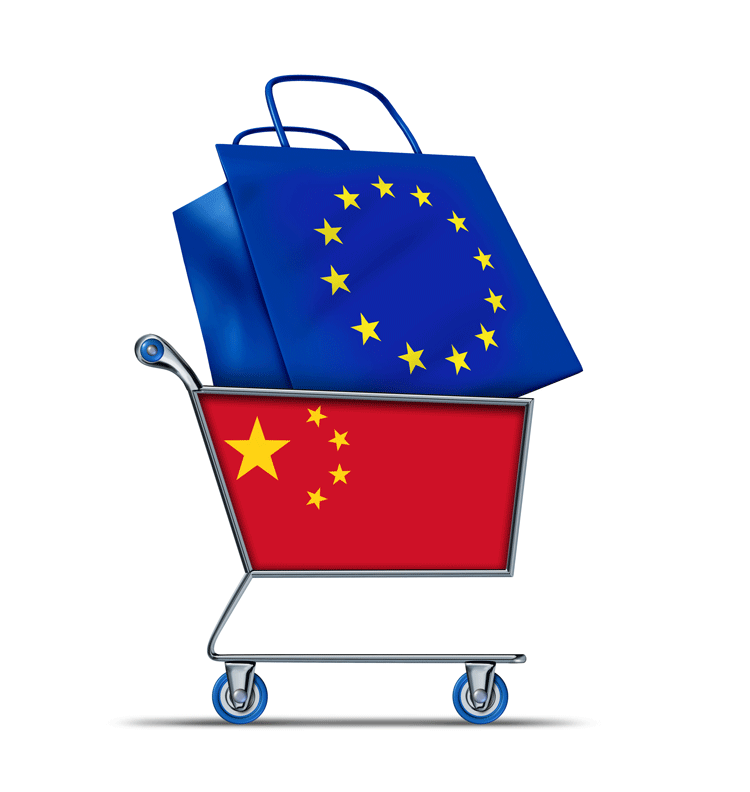 Although China is gradually shifting to a consumer-driven economy, opportunities for domestic consumer goods companies are actually becoming scarcer. Analysts point to the fact that they face persistent price deflation in a low-inflation environment, along with flat sales volumes in overcrowded markets.
Although China is gradually shifting to a consumer-driven economy, opportunities for domestic consumer goods companies are actually becoming scarcer. Analysts point to the fact that they face persistent price deflation in a low-inflation environment, along with flat sales volumes in overcrowded markets.
This is partly due to overcapacity, which is affecting several sectors, including food and beverage, retail and textiles. Rosario Di Maggio, Business Development Director at Vistra China, says that under these conditions, the high reputation enjoyed by many foreign brands could give them the edge in this expanding market.
Foreign brands win consumer favour
While in the current climate domestic brands are suffering in China, its marketplace is being increasingly filled by competing foreign brands. They are winning consumer preference due to the perception that they are better quality and more fashionable. In addition, e-commerce business models are making it easier for them to reach consumers, while lower logistics costs and reduced import tariffs are also playing an important role in their rise. But while it is not so surprising to hear that big brands are making their moves, the market is also attracting some heroic, small-sized businesses and a very determined bunch of entrepreneurs.
Saverio Paolillo is a 30-year-old Italian from Torre del Greco, a small city on the shores of the Gulf of Naples known for its production of coral jewellery since the seventeenth century. He is the fourth generation of a family of coral traders and, with his dad and three siblings, runs a business that sells coral in three continents. Four years ago, Paolillo moved to Guangzhou, the primary jewellery hub of China, to tackle a market that he defines as “astonishing for the numbers, crazy for the way people make purchasing decisions…and so difficult to understand that it became a permanent challenge”. Business was very good for the first three years, however, in the last six months, with growth rates slowing, Paolillo has started to look for more opportunities in other major cities, such as Beijing and Shanghai.
“I think it would be nice to live in China for a few more years and build strong sales channels. It is difficult as there are a lot of competitors and a lot of fake products around here, but clients are getting sophisticated,” says Paolillo.
China’s emerging middle class fuels consumption
A recent McKinsey report shows that China’s consumer spending data is not a reliable measure of prosperity and its economy is now too complex and distorted; what really counts is household income. China has an emerging middle class, with higher average household incomes and steadily rising consumption. Furthermore, the size of China’s average household income is ahead of other emerging markets, which makes China an unprecedented, unique and exciting phenomenon. The report forecasts growth of six per cent and above until at least 2020, for semi-necessities such as clothing and household products, and discretionary categories of goods such as transport and recreation. Moreover, a lot of income in China is unreported, which means that actual numbers are probably even higher.
The spending attitude in China is far heathier than in developed countries, where consumption has stalled in recent years. Consumption is rising 14 per cent a year among the under 35s (twice that of older generations). Another recent McKinsey study found that 55 per cent of consumers in China are confident that their incomes will rise significantly over the next five years. Furthermore, Boston Consulting Group predicts that even if economic growth falls to 5.5 per cent, China’s consumer economy will expand exponentially, creating an additional mass equal to the entire consumer economy of Britain or Germany.
 Exporting to China: the next big trend?
Exporting to China: the next big trend?
While many big brands seem very confident about these trends—Pepsi has just opened its first Quaker Oats manufacturing plant in China, Ferrero has recently opened a plant in Hangzhou (its biggest investment outside of Italy), and McDonald’s and Starbucks are already pushing to add 1,250 and 500 more outlets respectively—smaller players must be more cautious.
Anna and Artem are two young Russian entrepreneurs that, facing a troubled economy at home, decided to launch an e-commerce platform, importing Russian-manufactured goods to China. They sell products including canned food, beverages and cosmetics. After doing their homework and putting together a strong business plan, they approached several potential investors, until they found people interested in funding them. Their sales in China are made both offline and online, taking advantage of the new e-commerce wave. The decrease in the ruble and a strongly appreciating RMB has also given them an additional competitive advantage.
With a long history of excellence in producing consumer goods, exporting to China could well be the next trend for developed countries such as Australia, Italy, France or Spain. Developed countries that are able to produce more than they need and that have built brands over the decades tend to excel in exporting consumer and capital goods to China.
In a July 2016 special report on China, The Economist lays out all of China’s paradoxes regarding politics, society and the distribution of wealth. However, the article still struggles to explain the resilience of the current Chinese economic model. The article also referenced McKinsey’s data, which estimates the Chinese middle class to have reached 225 million households—with an additional 50 million households predicted by 2020—compared with only 5 million in 2000, and with an annual income between USD 11,500 and 43,000.
Tahsin Toraman is a businessman that relocated to Shanghai three years ago. With a strong background in medical consumables, he intends to tap into one of the biggest opportunities of all time: China’s ageing population.
“To come to China was a tough decision but the opportunities here are unbelievable…to build a business from scratch is probably more difficult here than anywhere else. It can also be very rewarding,” says Toramin. “You are on your own and all the information is confusing…before choosing my service providers, I met 20 of about 40 that I found over the Internet. Believe me, it wasn’t about the money, it was about trust. They had to show me that they knew what they were talking about, solve my problems and that I could trust them. This place is so difficult that you need to be able to rely on your advisers,” he concludes.
Conclusion
There are several recurring issues that small (and large) foreign businesses face when doing business in China, and several constants that characterise those that are successful. An unpredictable legislative environment, administrative issues and discretionary law enforcement are three of the main recurring issues pointed out by longstanding, resident foreign businesses. The result is that many small businesses will have their best people working to solve these problems instead of focusing on generating business. The only solution, to at least mitigate risks here, is to find a trusted adviser that can navigate you through these challenges.
As China is becoming a second-home market for many SMEs, you will need to send your best people on the ground to stay on top of the changing market, while still understanding its fundamental Chinese characteristics. Local managers will need direct access to headquarters to keep abreast of changes and adapt to new challenges and opportunities.
As the war for talent goes on, companies will struggle to recruit and retain good employees. Identifying strong technical skills in prospective local employees, though not easy, may be more important in developing business than individuals with strong English-language skills.
Finally, newcomers will need to budget wisely as China is not cheap, especially when the aim is to sell consumer goods and services, which requires localisation downtown in big cities. Rent, human resources and administration costs might be very high and taxes are not as low as you would expect. However, as Toraman rightly puts it, “to come to China was a tough decision but the opportunities here are unbelievable.”
Rosario Di Maggio has over 13 years’ experience in assisting SMEs with their foreign direct investment projects in Asia. He specialises in business structuring, international taxation and regulatory compliance. Di Maggio is also Chair of the European Chamber’s SME Forum. Vistra is a global independent provider of corporate services with 2,500 professionals and 63 offices in 40 jurisdictions. In China, Vistra is present with about 160 professionals in four major cities: Shanghai, Beijing, Guangzhou and Shenzhen. Our China team is dedicated to providing high-quality, tailored corporate services including company formation, accounting and tax compliance, HR advisory, payroll and company secretarial services.


Recent Comments